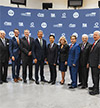The fund “can be the ripple in the pond,” stated Apple CEO Timothy D. Cook during the announcement on CNBC. “These manufacturing jobs create more jobs around them because you have a service industry that builds up around them.”
The Automation Federation, an industry group that supports the automation industry, applauds the news: “Initiatives like Apple’s $1 billion fund to promote advanced manufacturing jobs in the U.S. are welcome, since it places a much-needed focus on this area,” says Steve Mustard, an industrial cybersecurity expert at the Automation Federation. “The fund will be best utilized if it builds on existing initiatives, rather than starting anew and creating new, similar outputs.”

On May 12 Apple announced the first investment from the fund will go to glass supplier Corning. Corning is famous for its durable Gorilla Glass displays, which are used on many smartphone brands, including the iPhone. Apple plans to invest $200 million to support Corning’s R&D, capital equipment needs, and state-of-the-art glass processing.
Since 2007, the partnership between Corning and Apple has created nearly 1,000 jobs across Corning’s various R&D and manufacturing facilities, including about 400 workers at its 65-year-old facility in Harrodsburg, Kentucky, which needs modernization.
Mustard sees Apple’s investment as a wake-up call to U.S. manufacturers to transform their aging facilities into more efficient and productive “smart tech” operations, as well as to develop better technology skills among U.S. workers. According to Mustard, “Technology advances continue and the automation footprint increases. While this is often seen as a negative because of short-term job losses, the upside is a demand for an increasingly skilled workforce that is able to design, develop, manufacture, and support the automation systems used by the advanced manufacturing sector.”
The fund can be the ripple in the pond. These manufacturing jobs create more jobs around them because you have a service industry that builds up around them. Timothy D. Cook, CEO, Apple A Growing Trend
In introducing its fund, Apple joined a growing number of companies — for example, SoftBank and Infosys — that have recently pledged to invest in U.S. manufacturing and/or hire more U.S. workers.
In April 2017, Return One Million Jobs (ROMJ) and the Reshoring Initiative announced it would create a $20 million fund to bring one million manufacturing jobs back to the U.S. from offshore. The money will utilize global data analytics to help companies determine the total cost of supplying the U.S. market via manufacturing offshore or domestically.
Although these pledges and investments are a good start, there will likely be too few qualified workers to fill these openings when they happen. According to a skills gap study by Deloitte and the Manufacturing Institute, 80 percent of U.S. manufacturers today have difficulty finding qualified applicants for skilled production positions in their facilities. Further, an estimated 2 million manufacturing jobs are projected to remain unfilled by 2025. Meeting this challenge will require vigorous, sustained investment in developing a well-trained, well-paid workforce for the future.
“Developing a strong skilled workforce is key to reshoring and manufacturing growth,” says Harry Moser, founder/president of the Reshoring Initiative. “This starts by motivating a higher quantity and quality of recruits. By demonstrating that the trend is now away from offshoring and toward reshoring, we can make the case that manufacturing is once again a great choice for career stability and growth.”



